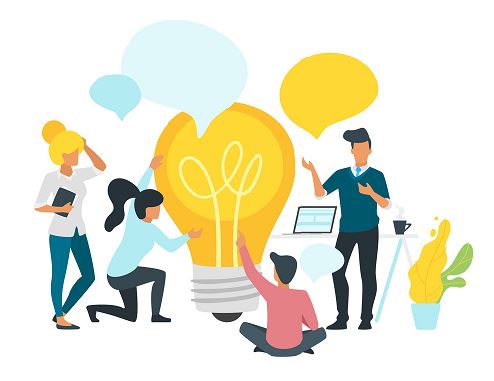Learning the Art of Critical Thinking Developing 21st Century Skills
Nurturing the Next Generation to Become Curious, Analytical and Confident Learners

Critical thinking has been called “the art of thinking about thinking” and aims to develop one’s thinking. It is the mental process of actively and skillfully thinking, using, analysing, relating and evaluating information to create new knowledge. In other words, critical thinking “is about being an active learner, not just a passive recipient of knowledge.
The main idea of positive thinking is to support creative thinkers, decision makers, problem solvers and self-sufficient citizens. This is also the need of the hour! 21st century Skills development can be described as the 4Cs most important skills for the 21st century – critical thinking, creativity, collaboration, communication and practicality. What do they think about free education?

The Process of Developing Positive Thinking
Thinking and problem solving are two sides of the same coin. In the problem-solving process, students are exposed to many steps and ideas that push children to think critically. Important steps are:
Critical thinking skills support and enable one to develop a positive attitude.
It includes the development of the following skills –
1. Problem solving – the ability to solve complex problems
2. Decision making – the ability to make sound decisions based on facts and good reason,
3. Analytical skills – the ability to analyze data to make decisions through analysis
4. Thinking skills – the ability to analyze, evaluate and connect
5. Evaluation skills – the ability to judge the quality of arguments and the credibility of speakers and writers\ Critical thinking skills are not developed in a day or two. This is an ongoing process. Bring schools and parents together to ensure that the next generation is curious, open-minded, thoughtful, analytical, thoughtful and determined. After all, aren’t these the characteristics of a confident person?
FAQs
- How to develop critical thinking skills, importance of critical thinking in 21st century, problem-solving and decision-making skills, analytical and evaluation skills, nurturing confident learners, positive thinking for creativity and collaboration
- What is critical thinking, and why is it important in the 21st century?
Critical thinking refers to the mental process of actively and skillfully thinking, using, analyzing, relating, and evaluating information to create new knowledge. It is important in the 21st century because it helps individuals become more innovative, adaptable, and self-directed learners who can solve complex problems and make sound decisions based on facts and good reasoning. - How can one develop critical thinking skills, and what are the steps involved?
Critical thinking skills can be developed through practice and repetition. Steps involved in developing critical thinking skills include identifying and challenging assumptions, analyzing and evaluating evidence, considering multiple perspectives, and making connections between ideas. - How can schools and parents work together to nurture the next generation to become analytical and confident learners?
Schools and parents can work together to nurture critical thinking skills in children by encouraging curiosity, open-mindedness, thoughtful analysis, and determination. This can be achieved through creating opportunities for students to engage in discussions, debates, and problem-solving activities. - What are the main components of critical thinking, such as problem-solving, decision-making, analytical and evaluation skills?
The main components of critical thinking include problem-solving, decision-making, analytical skills, thinking skills, and evaluation skills. Problem-solving involves the ability to solve complex problems, decision-making involves making sound decisions based on facts and good reasoning, analytical skills involve analyzing data to make decisions through analysis, thinking skills involve analyzing, evaluating, and connecting ideas, and evaluation skills involve judging the quality of arguments and the credibility of speakers and writers. - Can critical thinking skills be learned in a day or two, or is it an ongoing process?
Critical thinking skills cannot be learned in a day or two; it is an ongoing process that requires practice and repetition. Consistent practice and application of critical thinking skills can help individuals become more proficient in their use. - How does critical thinking support positive thinking and the development of a positive attitude?
Critical thinking supports positive thinking and the development of a positive attitude by helping individuals challenge their assumptions, consider multiple perspectives, and evaluate evidence before making decisions or forming opinions. - What are the 4Cs (critical thinking, creativity, collaboration, communication) of 21st century skills, and how do they relate to critical thinking?
The 4Cs of 21st century skills – critical thinking, creativity, collaboration, and communication – are closely related to critical thinking. These skills work together to help individuals become more innovative, adaptable, and self-directed learners who can solve complex problems and make sound decisions based on facts and good reasoning. - What are some longtail keywords related to critical thinking, problem-solving, decision-making, analytical and evaluation skills, positive thinking, creativity and collaboration?
- Longtail keywords related to critical thinking, problem-solving, decision-making, analytical and evaluation skills, positive thinking, creativity, and collaboration include: developing critical thinking skills, problem-solving strategies, sound decision-making, analytical thinking, evaluating evidence, positive attitude development, fostering creativity, collaborative problem-solving, effective communication.












